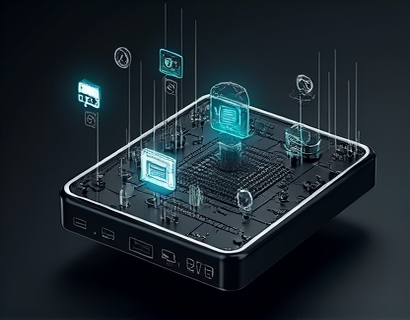AI-Driven Healthcare: Revolutionizing Personalized Medical Insights and Expert Advice
In the rapidly evolving landscape of healthcare, the integration of artificial intelligence (AI) is transforming the way individuals access and receive medical advice. This shift towards AI-driven healthcare solutions offers unprecedented opportunities for health enthusiasts and individuals seeking personalized support. By leveraging advanced technologies, these platforms provide instant, personalized medical insights and expert advice, empowering users to make informed health decisions and enhance their overall well-being.
The advent of AI in healthcare is not just a novelty but a transformative force that addresses longstanding challenges in the industry. Traditional healthcare models often struggle with providing timely, personalized care due to resource constraints and the sheer volume of patient data. AI-driven platforms bridge this gap by analyzing vast amounts of medical data in real-time, offering tailored recommendations and expert insights that were previously unattainable for the average user.
Instant Access to Personalized Medical Insights
One of the most significant advantages of AI-driven healthcare platforms is the instant access they provide to personalized medical insights. These platforms use machine learning algorithms to analyze user data, including medical history, lifestyle factors, and current symptoms, to generate relevant and accurate advice. This immediate access to expert-level information is particularly valuable for individuals who may not have easy access to healthcare professionals or who require quick assessments between appointments.
For instance, a user experiencing chest pain can input their symptoms into the platform, and within moments, receive a tailored assessment that considers their medical history and suggests the next steps, whether that involves seeking immediate medical attention or monitoring symptoms at home. This level of immediacy and personalization is a game-changer, especially in critical situations where every minute counts.
Expert Advice at Your Fingertips
AI-driven healthcare platforms do more than just provide instant insights; they connect users with expert advice from the comfort of their homes. These platforms often feature databases of medical professionals, including doctors, nutritionists, and mental health experts, who contribute to the development of algorithms and validate the information provided. Users can engage with these experts through chat interfaces, video consultations, or pre-recorded educational content, gaining access to a wealth of knowledge that would otherwise be difficult to obtain.
The expertise of these professionals is harnessed to create comprehensive and reliable advice. For example, a user with diabetes can receive personalized dietary recommendations based on the latest research and their specific health metrics. This not only enhances the user's understanding of their condition but also empowers them to take proactive steps in managing their health.
Enhancing User Engagement Through Interactive Tools
To further enhance the user experience, AI-driven healthcare platforms incorporate interactive tools that facilitate better engagement and understanding. These tools include symptom checkers, health trackers, and personalized health dashboards. Symptom checkers use AI to analyze user inputs and provide potential diagnoses, guiding users on whether to seek immediate medical attention or monitor their symptoms. Health trackers allow users to log and monitor various health metrics, such as heart rate, sleep patterns, and physical activity, providing a holistic view of their well-being.
Personalized health dashboards compile all this information into an easily digestible format, offering users a clear picture of their health status and progress over time. These interactive tools not only make the information more accessible but also encourage users to take an active role in their health management.
Building Trust Through Data Security and Privacy
Trust is a critical component in the adoption of AI-driven healthcare solutions. To address concerns about data security and privacy, these platforms implement robust security measures and adhere to strict data protection regulations. User data is encrypted both in transit and at rest, ensuring that sensitive information remains confidential. Additionally, users have control over their data, with options to manage who can access their information and for what purposes.
Transparency is key in building trust. AI-driven healthcare platforms clearly communicate their data usage policies and obtain user consent before collecting any information. By prioritizing user privacy and security, these platforms foster a safe and trustworthy environment for individuals to seek and receive medical advice.
Personalized Support for Chronic Condition Management
For individuals managing chronic conditions, AI-driven healthcare platforms offer tailored support that can significantly improve quality of life. These platforms use predictive analytics to monitor disease progression and suggest proactive measures to prevent complications. For example, a user with hypertension can receive alerts based on their blood pressure readings, along with recommendations for lifestyle adjustments and medication adherence.
Personalized support extends to mental health as well. Users dealing with anxiety, depression, or stress can access resources and tools designed to manage these conditions effectively. AI-driven chatbots and guided meditation sessions provide immediate relief and coping strategies, complementing traditional therapy and medication.
Educational Resources for Informed Decision-Making
Education is a cornerstone of AI-driven healthcare. These platforms offer a wealth of educational resources to help users understand their health conditions, treatment options, and preventive measures. Articles, videos, and interactive modules cover a wide range of topics, from common illnesses to complex medical procedures. This educational content is curated by medical experts to ensure accuracy and relevance, empowering users to make informed decisions about their health.
For health enthusiasts, these resources serve as a continuous learning tool, keeping them updated on the latest medical research and advancements. This knowledge not only enhances their understanding of their own health but also enables them to provide better support to others in their community.
Integration with Wearable Devices and Health Apps
The integration of AI-driven healthcare platforms with wearable devices and health apps further enhances their effectiveness. Wearable devices such as smartwatches and fitness trackers continuously monitor vital signs and activity levels, feeding this data into the platform for real-time analysis. This seamless integration allows for a more comprehensive view of a user's health, enabling more accurate and timely advice.
Health apps that track diet, sleep, and other lifestyle factors can also sync with the platform, providing a holistic approach to health management. For instance, a user's sleep data from a wearable device can be analyzed to identify patterns that may affect their overall well-being, leading to personalized recommendations for improving sleep quality.
Scalability and Accessibility
One of the most compelling aspects of AI-driven healthcare platforms is their scalability and accessibility. Unlike traditional healthcare services that may be limited by geographical location or financial constraints, these platforms can reach a global audience. Users from remote areas or those with limited access to healthcare facilities can benefit from the same level of expert advice and support as those in urban centers.
Moreover, many of these platforms offer free or low-cost services, making high-quality healthcare more accessible to underserved populations. This democratization of healthcare ensures that everyone, regardless of their background, can benefit from the advancements in AI technology.
Challenges and Future Directions
While AI-driven healthcare platforms offer numerous benefits, they also face challenges that need to be addressed. One major challenge is the need for high-quality, standardized data to train and validate AI algorithms. Ensuring the accuracy and reliability of these algorithms requires continuous effort and collaboration between tech companies, healthcare providers, and regulatory bodies.
Another challenge is the digital divide, where not all individuals have equal access to the technology required to use these platforms. Efforts to bridge this gap include developing user-friendly interfaces and providing educational resources to help users navigate these tools effectively.
Looking to the future, the integration of AI in healthcare is poised to become even more sophisticated. Advancements in natural language processing, computer vision, and predictive analytics will further enhance the capabilities of these platforms. The potential for AI to assist in disease diagnosis, personalized treatment planning, and even robotic surgery is vast, promising a future where healthcare is more precise, efficient, and patient-centered.
In conclusion, AI-driven healthcare platforms are revolutionizing the way individuals access and receive medical advice. By providing instant, personalized insights and expert support, these platforms empower users to take control of their health and make informed decisions. As technology continues to advance, the role of AI in healthcare will only grow, offering a brighter and more accessible future for all.










































